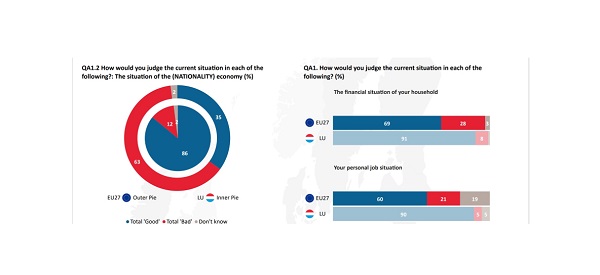 Credit: Eurobarometer
Credit: Eurobarometer
According to the latest Standard Eurobarometer survey, which measures public opinion in the European Union (EU), residents in Luxembourg displayed a predominantly positive spirit, particularly concerning the economy, both at the national level and at the personal level, in winter 2022-2023.
Despite the persistence of the conflict in Ukraine and the resulting high inflation, especially at the level of energy prices, the results of the Winter 2022-2023 Eurobarometer reflected an optimistic outlook among residents in Luxembourg. Nine out of ten respondents considered the situation in Luxembourg, their own professional situation and the financial situation of their household to be good. Contrary to the EU27 European average, a large majority considered Luxembourg’s economic situation to be positive.
Despite this positive approach, according to the survey, residents believed that there were some significant challenges in Luxembourg, particularly with regard to housing (52% of Luxembourg residents, compared to EU27 average of 8%) and rising prices (49% compared to 53%). Environmental, climate and energy issues were also among the most important issues at national level. Two developments drew particular attention: on the one hand, the level of insecurity, which was cited twice as much as in the previous survey, and, on the other hand, the energy supply, the mention of which, conversely, has halved since the last Eurobarometer.
72% of Luxembourg-based respondents saw the Russian invasion of Ukraine as a real danger for Luxembourg. Residents of Luxembourg were in favour of the measures taken at EU level to respond to the invasion, on the grounds, among other reasons, of defending European values (cited by eight out of ten people). In particular, a very large majority agreed to support people affected by war, whether by providing concrete aid or by welcoming them into the EU. A majority was also in favour of financial or military support, even if the proportion of favourable opinions was comparatively lower.
Anne Calteux, Head of Representation of the European Commission in Luxembourg, said: “It is indisputable that Luxembourg is a pro-European country and that Luxembourg's membership of the European Union is not in question, despite the corruption scandal in the European Parliament. I am particularly pleased that young people are the most likely to cite democracy as the element that best represents the EU. In addition, 85% report being attached to Europe, which is the strongest attachment at European level. Despite this, it remains crucial to communicate tirelessly on the subject of European action, so that the citizen is informed as well as possible and […] maintains confidence in the European project. I will attach major importance to this during my mission.”
The Standard Eurobarometer 98 survey was carried out for the European Commission between January and February 2023 in 39 countries including the 27 Member States of the EU and seven candidate countries. It takes stock of citizens' lives and their perception of them, as well as their perception of the EU.
Since the Standard Eurobarometer survey of winter 2021-2022 and before the data collection for the Standard Eurobarometer 98, the European political landscape was marked, among other things, by the following news: the pandemic situation became less urgent during 2022; the Russian invasion of Ukraine; high resulting inflation, especially in terms of the prices of energy and building materials; elections in several EU countries (for example France and Italy); the 27th United Nations Conference of Parties on Climate Change (COP27) in Sharm El-Sheikh; extreme heatwaves hit much of Europe, further causing major forest fires, disruption, displacement and record temperatures in many countries; a corruption scandal in the European Parliament at the end of the year.
The sample of Eurobarometer surveys is around 1,000 people per member state. Luxembourg is an exception with a sample of 510 people for the Standard Eurobarometer 98, whose field survey in Luxembourg took place from 12 January 2023 to 1 February 2023, through face-to-face interviews.









